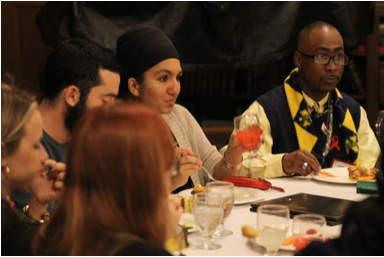I feel that there were many moments throughout the course during which I felt that I could speak as a minority, due to my race, religion, and gender. However, this course has shown me that I still hold a lot of privileged identities, including social class, sexual orientation, ability, and, in some environments, even race. I have been able to recognize the levels of oppression and that some of my own identities cause others to immediately view me as someone higher than them, especially when teaching the module. Although I became very uncomfortable with this idea, and am still uncomfortable to a certain degree, I have been able to see the benefit of sitting in this discomfort and using it to motivate me for social change. The moment we started to learn the module, I was paralyzed. The fear of making a mistake, of creating an early negative impression of my intelligence on my professor and class, or of receiving a poor grade petrified me and kept me in my seat. Years of education and public systems had conditioned me to believe that one should only volunteer if they know the answer and know that it is the best response. The only things that stop us from turning away completely from answering a question in class is the hope of receiving praise from our teacher and the feeling we have after receiving this praise.
Unfortunately, I do not think that I ever completely made the module my own, because of this hesitation to break to the mold. Even still, I was able to see the benefit of it when Groundcover News vendors took the module and added their own personality and flavor to each section, clearly diversifying it from what they were taught. This is only one instance of how they were able to teach me, going back to Freire’s idea of the student becoming the teacher.
As we taught the module, the banking education model continued to take hold over our methods. We met with the vendors about five times, but the first few times were very difficult. As teachers, we were very persistent about ensuring that our students were able to do the module the exact same way that we were taught. We were unable to see the difference between genuinely valuable information and material that was added by the teacher because it was pertinent to them. Because of this, the vendors were not able to make the module more personalized until the last session or second-to-last session. However, when this “owning” of the module finally occurred, it was beautiful. The way that Joe and Michael were able to see the relevance of “FACTS” and “LUCK” in their own lives was inspiring. Michael talked about doing the module in elementary schools to ensure that his children and grandchildren were safe. Joe also wanted to teach generations of youth, and they both wanted to spread this amongst the other vendors, in order to better their own community. This act of giving back to the community is such a clear example of self-liberation. By trusting their fellow vendors to be able to learn this and continue to pass it forward, Joe and Michael will be starting a community-organized movement for HIV and AIDS education. I feel blessed to have been able to witness it.

My biggest regret from the past year is that I have not been able to commit as much time to Groundcover News as my first two years here. Ironically, my time instead has been spent working with various “social justice” organizations on campus to discuss and work to end issues of oppression. Freire directly warns against this as he says, “The man or woman who proclaims devotion to the cause of liberation yet is unable to enter into communion with the people, whom he or she continues to regard as totally ignorant, is grievously self-deceived” (Freire, p. 61). Although it is still important to have conversations about oppression and social injustice in a privileged context, it is important to actually work with the oppressed and include them in this conversation of oppression. I hope to reflect further on my own privilege, as “Those who authentically commit themselves to the people must re-examine themselves constantly” (Freire, p. 60), and work towards entering into a relationship with the people I hope to help. The module allowed me to see the great benefit that I reap from working with Groundcover News and its vendors, which is so much larger than the impact that they can have on me. Over the next year, I hope to use this experience to reenter working much more with Groundcover News and the vendors, to understand my role as the oppressor, to maintain my consciousness of the way that I play into this cycle of oppression and privilege, and to build my trust of the people.

